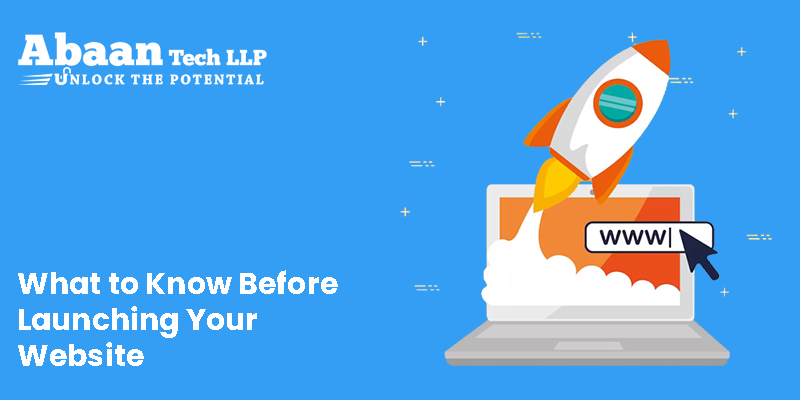Launching a website is an exciting step in establishing your online presence. Whether it’s for your business, personal blog, or a creative project, a well-thought-out website can help you reach a wider audience and achieve your goals. However, before you dive headfirst into the world of website creation, there are some essential things you should know. In this guide, we’ll break down what you need to consider before launching your website in easy-to-understand language.Your Attractive Heading
Define Your Purpose and Audience:
Before you start designing and building your website, it’s crucial to have a clear understanding of why you’re creating it and who your target audience is. Are you selling products, sharing knowledge, or showcasing your portfolio? Knowing your purpose and audience will help you tailor your website’s content and design to meet their needs.
Choose a Domain Name:
Your domain name is your website’s address on the internet (e.g., www.yourwebsite.com). Pick a domain name that is relevant to your content and easy to remember. Ensure it’s not too long or complicated. Check if your desired domain name is available and register it through a domain registrar.
Select a Web Hosting Provider:
Web hosting is like renting space on the internet to store your website’s files and make it accessible to visitors. Choose a reliable web hosting provider that offers good performance, security, and customer support. Consider your budget and the resources your website will need.
Plan Your Website Structure:
Outline the structure of your website. Decide on the main pages and how they will be organized. Common pages include the homepage, about page, contact page, and product or service pages. A well-organized website makes it easier for visitors to navigate and find what they’re looking for.
Content Creation:
Start creating content for your website. Write engaging and informative articles, product descriptions, or whatever is relevant to your site’s purpose. Use clear and simple language to make it easy for your audience to understand.
Choose a Content Management System (CMS)
A CMS is a platform that helps you build and manage your website. Popular options include WordPress, Wix, and Squarespace. Choose a CMS that aligns with your technical skills and website goals. Many CMS options are user-friendly, even if you’re not a tech expert.
Design Your Website:
Your website’s design should be visually appealing and user-friendly. Choose a clean and responsive design template that looks good on both desktop and mobile devices. Use colors, fonts, and images that match your brand and appeal to your target audience.
Optimize for SEO:
Search Engine Optimization (SEO) helps your website rank higher on search engines like Google. Research relevant keywords and use them in your content and meta tags. Create a sitemap and submit it to search engines to help them index your site.
Test Your Website:
Before launching, thoroughly test your website to ensure everything works as expected. Check for broken links, typos, and any issues with functionality. Test it on different browsers and devices to ensure compatibility.
Set Up Analytics:
Website analytics tools like Google Analytics can provide valuable insights into your website’s performance. Set up analytics to track visitor behavior, traffic sources, and other relevant data. This information will help you make informed decisions to improve your site.
Secure Your Website:
Website security is essential to protect your site and your visitors’ information. Install security plugins or software, use strong passwords, and keep your CMS and plugins up to date. Regularly back up your website to safeguard your data.
Create a Privacy Policy and Terms of Service
Depending on the nature of your website, you may need a privacy policy and terms of service. These documents outline how you collect and use visitor data and the rules governing your website. Ensure they are clear and compliant with relevant laws.
Prepare for Launch:
Double-check everything before launching your website. Make sure your domain is properly connected to your hosting, all content is uploaded, and any necessary plugins or integrations are functioning correctly.
Promote Your Website:
After launching, don’t wait for visitors to magically appear. Promote your website on social media, through email marketing, and by reaching out to your existing network. Consistent promotion is key to growing your online presence.
Monitor and Update Regularly:
Your website is not a one-and-done project. Regularly update your content, check for broken links, and make improvements based on visitor feedback and analytics. A well-maintained website will continue to serve your goals effectively.
In conclusion, launching a website is an exciting venture that can open up numerous opportunities. By following these steps and being mindful of your website’s purpose and audience, you can create a successful online presence. Remember, building a website is an ongoing process, and with dedication and effort, your site can thrive and achieve your desired objectives. Good luck with your website launch!

